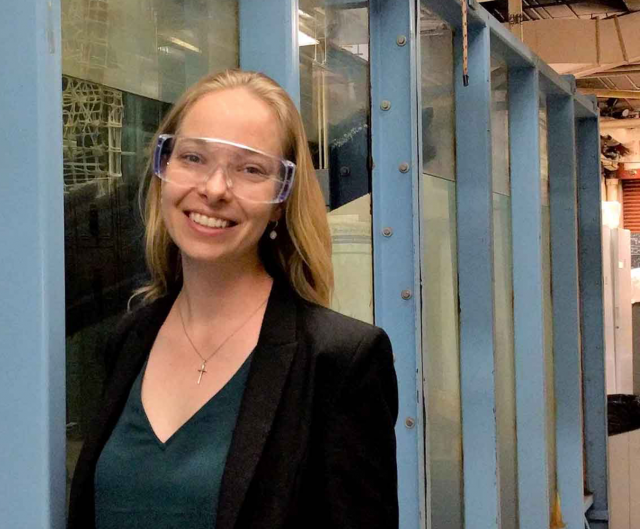NEWS Prof. Deborah Sunter profiled by the US Department of Energy
Deborah Sunter, Ph.D., spent two years as a postdoctoral fellow with the U.S. Department of Energy Office of Energy Efficiency and Renewable Energy in the Postdoctoral Research Award Program. Sunter’s research explored and expanded a modeling platform designed to help evaluate and meet the United States’ growing energy demands. Her research and contributions have been recognized in the global scientific community.
For the original, click here.
Sustaining our Future through Energy Security
Sixty-six percent of the world’s population will be living in urban areas by 2050, according to the United Nations 2014 World Urbanization Prospects report. In the United States, more than 80% of the population already lives in urban areas. The consensus affirms that increased urbanization is the future. As global urbanization and population growth expand, so does energy consumption.
Energy security requires an understanding of future energy demands and the environments from which the demands originate. Global population growth and rapid urbanization are being tracked, but climate change throws in the wild card of uncertainty. Urban energy systems are vulnerable to climate change and extreme weather, including storms, flooding and sea-level rise. Urban areas must be resilient to handle these changing conditions if they are to remain sustainable and continue to grow.
Mechanical engineer Deborah Sunter, Ph.D., is one of many scientists who have researched the very complex issue of energy security.
“Every day is an adventure with new challenges, new collaborations and new ideas,” said Sunter.
Sunter received a postdoctoral appointment in the Renewable and Appropriate Energy Laboratory (RAEL) at the University of California, Berkeley. Her appointment to the Postdoctoral Research Award Program was funded by the Solar Energy Technologies Office of the U.S. Department of Energy (DOE), Office of Energy Efficiency & Renewable Energy Research Participation Program.
The prestigious postdoctoral research award supports scientific research in energy efficiency and renewable energy by attracting scientists and engineers to pursue breakthrough technologies in energy research.
Sunter spent her two-year appointment at RAEL exploring the SWITCH (Solar and Wind Energy Integrated with Transmission and Conventional Sources) modeling platform. SWITCH is used to examine cost-effective investment decisions for meeting electricity demand, with an emphasis on integrating renewable energy into the electrical grid. Created as an investment planning tool, the model explores the cost and feasibility of future energy initiatives while simultaneously ensuring that current energy demands are met and policy goals are reached at the lowest cost possible. SWITCH meets this objective by making a series of optimized decisions. For example, all power plants have an expected lifetime. When a power plant reaches the end of its life expectancy, SWITCH examines whether it is more cost-effective to upgrade the existing power plant or to retire the power plant and build a new one. SWITCH can determine which type of power plants should be built and where these plants should be located with the goal to produce low-cost energy systems that meet reliability, performance and environmental quality standards.
SWITCH was originally designed and produced by Daniel Kammen, Ph.D., and his team at the Energy and Resources Group of the University of California, Berkeley. Kammen served as Sunter’s mentor throughout the program. Since producing the initial papers in 2012, Kammen and a series of graduate students and postdoctoral fellows have expanded the toolkit significantly, and SWITCH continues to undergo improvements at RAEL. RAEL is an interdisciplinary laboratory founded by Kammen in 1999; it seeks to advance renewable and appropriate energy through technology innovation and policy implementation.
Sunter’s appointment and access to SWITCH allowed her to research the role of technology innovation and policy in reducing emissions, improving efficiency and supplying more renewable energy to the U.S. electrical grid. During her time, Sunter expanded the SWITCH model, originally designed for the Western Electricity Coordinating Council, to encompass the entire continental United States. Sunter helped to convert SWITCH from an older programming language to Python to increase accessibility to the scientific community. She also partnered with private companies to add new emerging technologies to the program’s repertoire, such as Google Project Sunroof and CalWave Power Technologies.
Sunter’s accomplishments during her postdoctoral experience are numerous. Sunter published many works with her colleagues during her appointment, most notably a high-impact article with Kammen in the journal Science. The article on urban energy systems has received much attention in the scientific community. Sunter also credits her postdoctoral experience for expanding her research horizons.
“Beyond the core research project, I have been able to learn a new subject area, data science, and engage with the greater scientific community in ways that I had not done before,” said Sunter.
Sunter used her newly learned skills to win a data science hackathon in solar energy as well as organize a successful forum on data science for sustainability. Sunter has been invited to speak on her research at more than a dozen scientific engagements, and she was selected to be on a team of international authors for a book on inclusive green growth metrics. Throughout her appointment, she shared her expertise with undergraduates at the lab.
“I have been able to do more during this research experience than I possibly could have imagined. It opened doors I didn’t realize I had access to,” Sunter said. “This has been one of the most professionally rewarding experiences of my life. I am incredibly grateful for this opportunity.”
Immediately following the completion of the program, Sunter became a research fellow at the Berkeley Institute for Data Science. Most recently, she has accepted a position as a professor at Tufts University in the Department of Mechanical Engineering for the fall of 2018.
The Postdoctoral Research Award Program is funded by the Solar Energy Technologies Office of the U.S. Department of Energy (DOE), Office of Energy Efficiency & Renewable Energy Research Participation Program. The program is administered through DOE’s Oak Ridge Institute for Science and Education (ORISE). ORISE is managed for DOE by ORAU.

You must be logged in to post a comment.